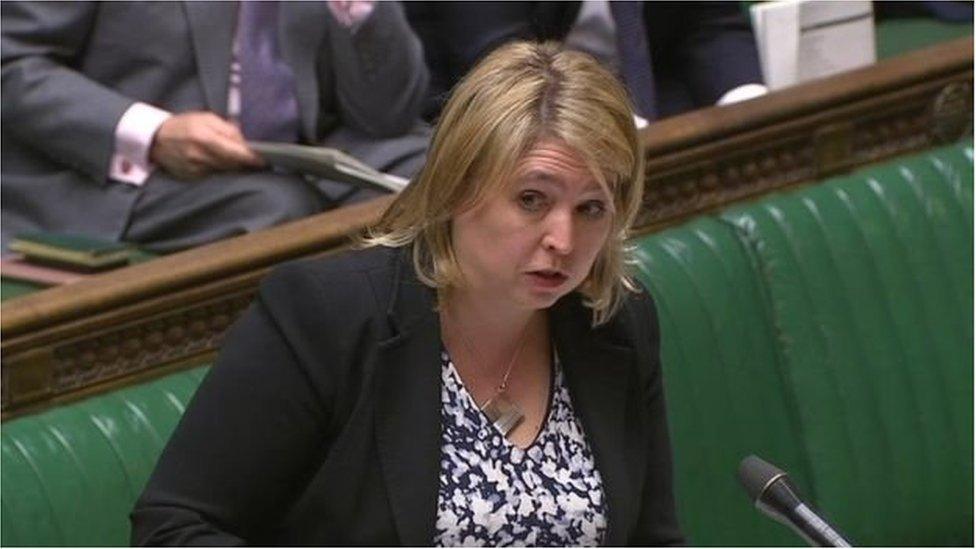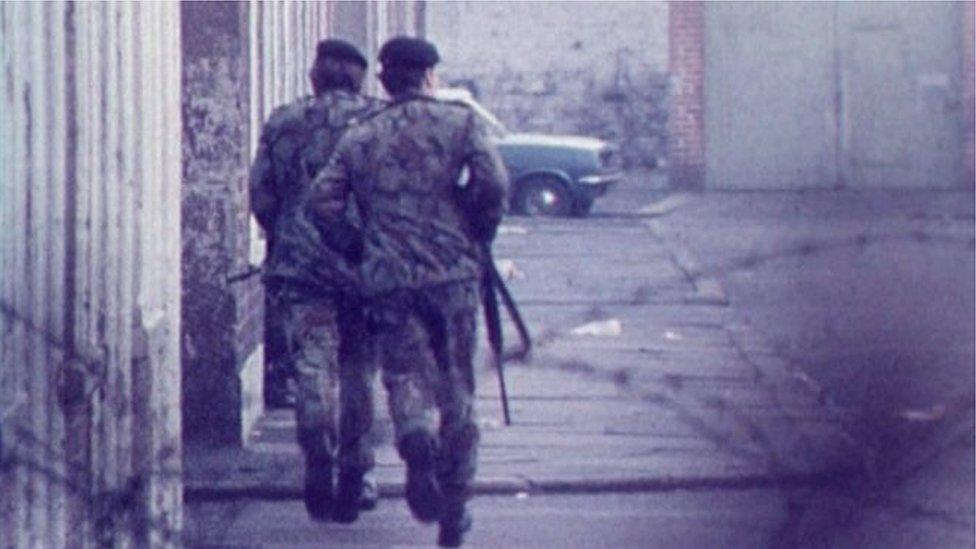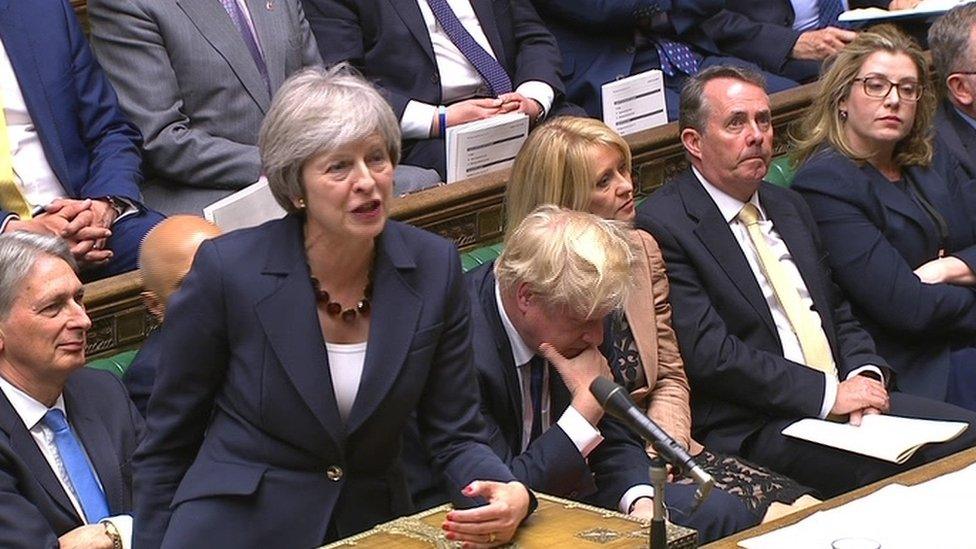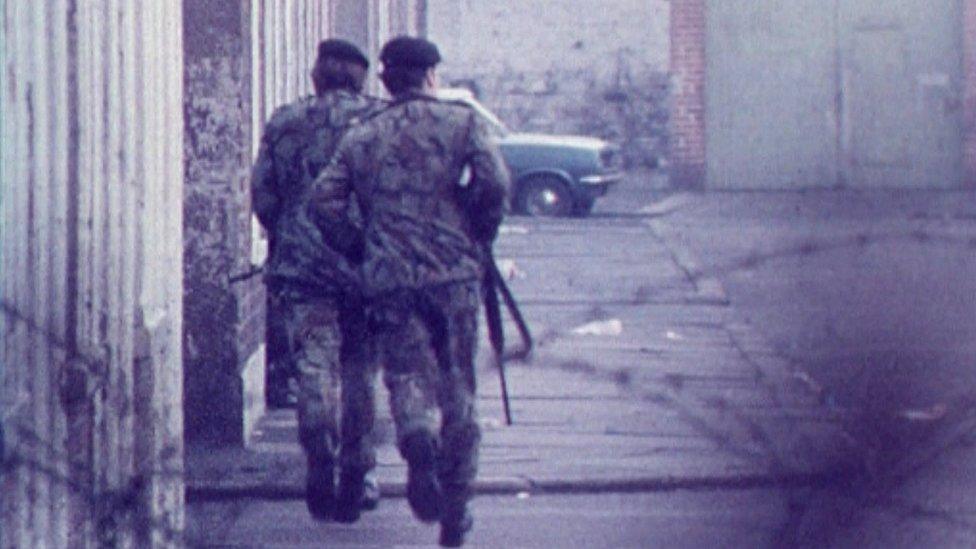Troubles legacy consultation launched by government
- Published

Secretary of State Karen Bradley has announced a public consultation to deal with the legacy of the Troubles
A public consultation process on the legacy of the Troubles has been launched by the government.
It comes despite reports of a row around the cabinet table over the decision to drop plans to prevent the prosecution of soldiers involved in killings.
The consultation will last four months and close on 10 September.
DUP leader Arlene Foster has encouraged groups representing victims to engage fully with the process.
"It is vital that the voice of victims is at the centre of this process and that their views shape the outcome," she said.
Northern Ireland Office (NIO) officials say the proposal has the "full support" of ministers.
But they did admit there were "differing views" over the issue.
'Ringing endorsement'
On Wednesday, Prime Minister Theresa May said the system for investigating the past in Northern Ireland was "patently unfair."
And Secretary of State Karen Bradley agreed with a Conservative MP, who said many of his colleagues would not be prepared to "blithely" support the setting up of any institutions "which would scapegoat our military veterans to pander to Sinn Féin".

A statute of limitations for soldiers involved in killings is being demanded by many Conservatives
But on Friday, her officials said the consultation had "absolutely the ringing endorsement of the secretary of state."
That is in spite of the fact the document still does not have provision for a statute of limitations for soldiers as demanded by many Conservatives.
A so-called statute of limitations would prevent military veterans from being prosecuted.
As already reported by the BBC, the legacy consultation document and draft bill outlines plans for:
An Historical Investigations Unit which would have a caseload of about 1,700 Troubles related deaths and aim to complete its work in five years.
An Independent Commission on Information Retrieval which would only look for information if asked to do so by families
An oral history archive which would collect recorded memories and stories about the Troubles in one place
An implementation and reconciliation group with 11 members representing the UK and Irish governments, along with the five biggest Northern Irish political parties
'Perverse'
Mrs Bradley said "now is the time for everyone with an interest in addressing the legacy of Northern Ireland's troubled past to have their say".
Sinn Féin deputy leader Michelle O'Neill said the publication of the draft bill was "long overdue".
"This is much too important an issue for it to be jeopardised by in-fighting within the Tory cabinet as we have seen over recent days," she said.
Ulster Unionist leader Robin Swann raised concerns over the proposed investigations unit.
"It will be a parallel police force under the direction of an independent director, with the same powers as the PSNI in terms of arrest and investigation, but we believe it will target its activities against former soldiers and police officers," he said.

Amnesty's Grainne Teggart said the plans were "devoid of necessary detail and glaring gaps remain"
TUV leader Jim Allister described the proposals as falling "well short of what innocent victims need and should expect from the government".
"Under these proposals the terrorist injured by his own bomb is seen as the same as the innocent housewife injured in that bombing while going about her shopping," he added.
"That is perverse and an obscenity."
Amnesty International said the plans "neglect the rights to investigations of those tortured and injured in the conflict".
Grainne Teggart, Amnesty Campaigns Manager for Northern Ireland, said: "Regrettably, the proposals neglect the rights to investigations of those tortured and injured in the conflict.
"Any measure of redress for these victims has been left to a Northern Ireland Executive which doesn't exist," said the organisation's Grainne Teggart.
Meanwhile, it is understood the Department of Justice at Stormont is currently working on a business case over the issue of legacy inquests.
It will then be passed to the Department of Finance.
In 2016, the Lord Chief Justice Sir Declan Morgan sought additional funding to complete 54 inquests into 94 deaths within five years.
- Published9 May 2018

- Published8 May 2018
